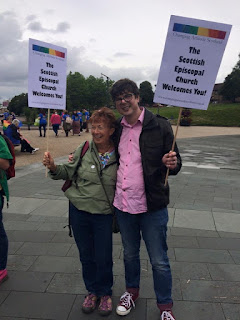Tolerant no more⤴
from Christine McIntosh @ blethers
I exaggerate, of course - always one for the soundbite. However, I'm not about to exaggerate now. We'd been discussing Mission - the hows, the who, the strategies. We'd argued the finer points of pew-removal, and whether this was A Good Thing. We'd talked about town-centre churches and churches stuck up a hill in the back of beyond; we'd pondered the desirability of holding discussions in a pub rather than in church after a service. It had been borne in on me anew that if the committed in any congregation are unable to demonstrate why they go to church by the way they refer to it, to what goes on there, and make it sound fun, frankly, then I wouldn't be tempted to visit. (I use the word "fun" loosely, you understand, for "fun" can encompass much - but it involves a spark however you find it).
There was also this business of language. (I'll get on to the blogging connection, I promise, but I'm started now ...) I suspect we're all a bit different in our reactions to the different language we use to discuss our religious experience. I'm turned off by a great deal of traditional evangelical terminology myself; I can see it's helpful to other people but it makes me run a mile. So we have to gauge our audience and communicate accordingly - and if that means I often speak about religion in rather unexpected language then that's fine. I've spent my working life sizing up my audiences (classes, if you didn't know - classes of adolescents) and making my subject matter accessible and interesting, and I've transferred that to any sharing of religious experience now. I reckon self-awareness is tied up with that - do we ever objectively consider how we come across to people?
And then there's social media. (Told you I'd get here). There are still people who "don't do social media" - and they say it as if there was a bad smell under their noses. Most of them are not exactly young, but it's surely more important to be youthful in our willingness to use whatever is available to make life easier? How on earth do you share anything with people who are (a) under 60 (b)total strangers (c)not exactly strangers but not intimate acquaintances, if you refuse to have anything to do with the vehicle through which they conduct an increasing amount of their social life?
And do you know something? I'm no longer prepared to allow that the people who react like this have a right to their own opinions. If that's how they feel about it, perhaps they ought to consider themselves out of the game, as far as Mission is concerned. If that's how our church is seen, it will die.
Happily, there are people who are not leaving the table (I'm hooked on Leonard Cohen's latest album just now, and it's supplying a soundtrack to this) - and some of them have been running the church, and some of them are prominent social media figures, and the interaction they engender by online discussion in popular forums (or should I stick to fora?) involves far more than just the members of the club. Now, at Synod, people are reminded of the power of social media and asked to tweet civilly - a change from the days when it was de rigeur to scoff at the silly names of the platforms instead. I've been scoffed at publicly in the past - but not any more.
So can we have the next generation of missionaries (shall I call them that?) who will incorporate the use of social media into their talk as naturally as they used to talk about coffee mornings? And maybe, for the people who would prefer the latter, a deliberate policy of education to enable them to continue to be effective?
But why bother writing all this? If you read it, you're using social media anyway. I'm preaching to the choir. But maybe it's just because I want to be less tolerant, and my own blog is a place to do it...



